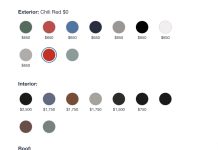Here’s the latest reader question, along with my reply!
William asks: After watching a number of videos on YouTube about hybridized cars, I came across this curious thought: Don’t buy one if you do not think you will drive the vehicle less than 3,000 to 4,000 miles per annum. Your assessment of that will be much appreciated. Also, your recommendation for the best SUV of the medium sized entries (hybrid and non hybridized) would be also appreciated.
My reply: The idea here is that to make a hybrid make economic sense, one must work off their higher up front cost via savings as you drive, on fuel. Since the typical hybrid car costs about $4k more to buy than an equivalent non-hybrid, one would need to drive a given number of miles to “save back” that sum – at which point you reach break even.
From that point onward, you are actually saving money. But not until then.
Before the beginning of this year, the “math” – the economic case for hybrids – was much less favorable because gas cost about $2.25 per gallon and thus, it would take a lot of miles to work off the $4k or so additional you paid to buy something like a Prius ($24,525) rather than a non-hybrid Corolla ($20,075) or similar – even though the Prius averages about 20 MPG better overall than the Corolla.
If you only drove three or four thousand miles annually, it would take many years of driving the Prius reach break even – if you ever reached it at all. Assuming gasoline costs what it cost last year.
The approximately $4k more you paid for the Prius in the above scenario would buy roughly 1,700 gallons of gasoline (at roughly $2.25, as last year). That’s enough to refill the Corolla’s 13 gallon tank more than 130 times. And the Corolla can go about 430 miles on a full tank.
You can see where this is headed…
Eventually, the Prius does catch up – if you drive it enough. But by then, the car is likely to be getting long in the tooth. Specifically, its battery – which like every battery gradually loses its capacity to retain charge over time – will be getting long in the tooth by then.
As its capacity to retain charge diminishes, the Prius’ mileage will diminish. The only way to recover its original 56 MPG capability at this point is to replace the battery – and that will set you back appx. $1,500 (in this case). Now you’ll have to work that off – again. And now you’re driving an elderly hybrid, which like any other elderly car will begin to cost you money for others things, as they begin to wear out (e.g., suspension components, exhaust system, AC, electronics, etc.)
Now, the scenario changes when the price of gas goes up – a lot – as it has. You will reach the break even point much sooner and so save money sooner, possibly a great deal – assuming you reach break even after say three or four years of driving.
But even if gas costs $4 per gallon, it takes a long time to reach break even when you’re only driving three or four thousand miles annually. You may reach it, eventually – but it really comes down to how long you’re willing to keep the car. If it’s more than 10 years, then it might still make sense financially to buy the hybrid; it makes even more sense as the price of gas goes up, courtesy of Uncle Joe.
But keep in mind the cost of battery replacement – as well as the costs of depreciation and repair, as the car ages.
On the rest: There are SUVs and there are crossovers. The difference isn’t semantical even though it is common for people to use the terms interchangeably. An SUV – traditionally speaking – is a vehicle based upon a truck-type chassis or “platform” that has been enclosed to accommodate more passengers. It will generally be rear-wheel-drive with four-wheel-drive (and 4WD Low range) gearing available. It will be more rugged and capable (e.g., as regards towing capacity and off-road work) than a crossover, which is generally speaking a vehicle that looks like an SUV but which is built off of a car-type platform or chassis and usually front-wheel-drive, with AWD available (some come with it standard) but without the 4WD system’s two-speed transfer case and Low range gearing.
While not as rugged and capable as an SUV, the crossover is usually more practical because it is more space efficient inside – this being a function of the crossover’s FWD/AWD layout (the floorpans are flatter, especially in the rear, because there’s no need to make room underneath them for a truck-type rear axle and suspension).
A good example of an SUV is the Chevy Tahoe – which is based on the Chevy half-ton pick-up truck. A good example of a crossover is the Lexus RX350, which is related to the Toyota Camry/Avalon.
So, to answer you question more exactly, I’d need to know whether you need/want an SUV or a crossover. The answer will be based on your preferences as well as such criteria as towing/off-road capability.
If you’ll provide the above I’ll be happy to offer some specifics!
Just click the “reply” button…
. . .
Got a question about cars, bikes, Libertarian politics – or anything else? Click on the “ask Eric” link and send ’em in! Or email me at EPeters952@yahoo.com if the @!** “ask Eric” button doesn’t work!
If you like what you’ve found here please consider supporting EPautos.
We depend on you to keep the wheels turning!
Our donate button is here.
If you prefer not to use PayPal, our mailing address is:
EPautos
721 Hummingbird Lane SE
Copper Hill, VA 24079
PS: Get an EPautos magnet or sticker or coaster in return for a $20 or more one-time donation or a $10 or more monthly recurring donation. (Please be sure to tell us you want a magnet or sticker or coaster – and also, provide an address, so we know where to mail the thing!)
My eBook about car buying (new and used) is also available for your favorite price – free! Click here. If that fails, email me at EPeters952@yahoo.com and I will send you a copy directly!











I think for most people, even with high gas prices, the hybrid won’t make sense.
Especially if you can pick up a regular car for less than what they were going for. My folks picked up a new 2018 Ford Focus (so it was closing in on being two years old, since it was made late 2017) in 2019 (before the prices went crazy). It MSRP was $22k. There were no takers for that price for two years, so at the time, the dealer was ready to deal to get it off his lot. They paid $14,500 for it. So basically a new car (titled as such too, since it hadn’t sold) with 36 miles for about half price.
You can buy a lot of gas, even at $3.35 when didn’t pay $25k for a car that only gets a bit better mileage than a Focus.
It also doesn’t make sense if you trade in cars often too. If you trade it back in at two to four years old, you haven’t gotten to the pay back time yet.
But most people really don’t do the math and buy the Prius when they should have bought the the Corolla. The Prius starts at $4,500 more. The Corolla is cheaper (and better looking to boot) and probably holds it value better too.
But people don’t like to do math and it gets them in the pocketbook. That’s how they end up losing money driving for the ride-share companies, but that is another subject……
Thank you for the extensive answer. I am looking for a Crossover, medium sized. I am 84 years old and hauling things out of my 2002 Corolla’s trunk can get problematical. By the way, that Corolla has 52,000 actual miles on it. I also have a 2006 Sprinter with 62,000 miles on it. Both were purchased during their model years with 12,000 miles on each. That will tell you how hard we drive those things. We are looking for a Crossover in these particular brands: Nissan, Toyota, Chrysler/Dodge and Ford because those are the dealers here in Lake Havasu. I would be considering a Kia or Hyundai but guarantee work would necessitate a drive of over 120 miles round trip, something we would not like.